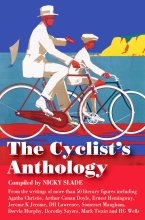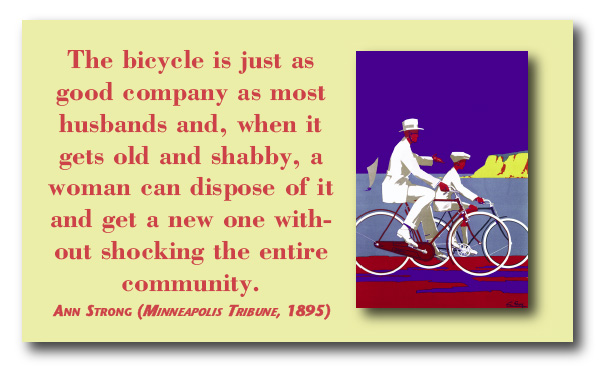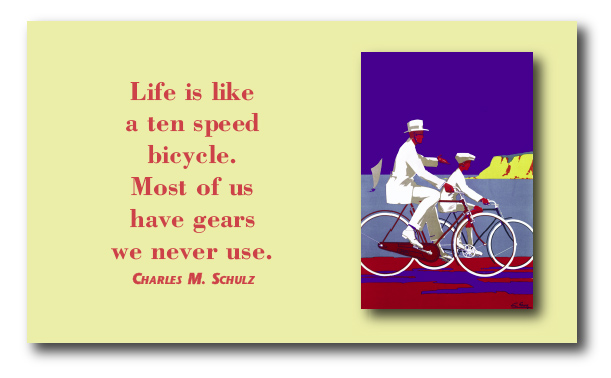Practical guidebooks for the more adventurous traveller.
— The Herald

The Cyclist's Anthology
Excerpt:
Sample 2: Tandem Trouble, 1914 (Jerome K. Jerome)
Contents | Introduction | Sample 1: A Passage to India (E.M. Forster, 1924) | Sample 2: Tandem Trouble, 1914 (Jerome K. Jerome) | Sample 3: Mulga Bill's Bicycle, 1896 (A.B. 'Banjo' Paterson)
Tandem Trouble, 1914
Jerome K. Jerome
The sequel brings back the three companions who figured in Three Men in a Boat, this time on a bicycle tour through the German Black Forest. They take one bicycle and a tandem.
There is always unpleasantness about this tandem. It is the theory of the man in front that the man behind does nothing; it is equally the theory of the man behind that he alone is the motive power, the man in front merely doing the puffing. The mystery will never be solved. It is annoying when Prudence is whispering to you on the one side not to overdo your strength and bring on heart disease; while Justice into the other ear is remarking, ’Why should you do it all? This isn’t a cab. He’s not your passenger:’ to hear him grunt out: ’What’s the matter—lost your pedals?’
Harris, in his early married days, made much trouble for himself on one occasion, owing to this impossibility of knowing what the person behind is doing. He was riding with his wife through Holland. The roads were stony, and the machine jumped a good deal.
’Sit tight,’ said Harris, without turning his head.
What Mrs. Harris thought he said was, ’Jump off.’ Why she should have thought he said ’Jump off,’ when he said ’Sit tight,’ neither of them can explain.
Mrs. Harris puts it in this way, ’If you had said, ’Sit tight,’ why should I have jumped off?’
Harris puts it, ’If I had wanted you to jump off, why should I have said ’Sit tight!’?’
The bitterness is past, but they argue about the matter to this day.

Be the explanation what it may, however, nothing alters the fact that Mrs. Harris did jump off, while Harris pedalled away hard, under the impression she was still behind him. It appears that at first she thought he was riding up the hill merely to show off. They were both young in those days, and he used to do that sort of thing. She expected him to spring to earth on reaching the summit, and lean in a careless and graceful attitude against the machine, waiting for her. When, on the contrary, she saw him pass the summit and proceed rapidly down a long and steep incline, she was seized, first with surprise, secondly with indignation, and lastly with alarm. She ran to the top of the hill and shouted, but he never turned his head. She watched him disappear into a wood a mile and a half distant, and then sat down and cried. They had had a slight difference that morning, and she wondered if he had taken it seriously and intended desertion. She had no money; she knew no Dutch. People passed, and seemed sorry for her; she tried to make them understand what had happened. They gathered that she had lost something, but could not grasp what. They took her to the nearest village, and found a policeman for her. He concluded from her pantomime that some man had stolen her bicycle. They put the telegraph into operation, and discovered in a village four miles off an unfortunate boy riding a lady’s machine of an obsolete pattern. They brought him to her in a cart, but as she did not appear to want either him or his bicycle they let him go again, and resigned themselves to bewilderment.
Meanwhile, Harris continued his ride with much enjoyment. It seemed to him that he had suddenly become a stronger, and in every way a more capable cyclist. Said he to what he thought was Mrs. Harris:
’I haven’t felt this machine so light for months. It’s this air, I think; it’s doing me good.’
Then he told her not to be afraid, and he would show her how fast he could go. He bent down over the handles, and put his heart into his work. The bicycle bounded over the road like a thing of life; farmhouses and churches, dogs and chickens came to him and passed. Old folks stood and gazed at him, the children cheered him.
In this way he sped merrily onward for about five miles. Then, as he explains it, the feeling began to grow upon him that something was wrong. He was not surprised at the silence; the wind was blowing strongly, and the machine was rattling a good deal. It was a sense of void that came upon him. He stretched out his hand behind him, and felt; there was nothing there but space. He jumped, or rather fell off, and looked back up the road; it stretched white and straight through the dark wood, and not a living soul could be seen upon it.
✰ ✰ ✰
The young man… suggested the police station at the next town. Harris made his way there. The police gave him a piece of paper, and told him to write down a full description of his wife, together with details of when and where he had lost her. He did not know where he had lost her; all he could tell them was the name of the village where he had lunched. He knew he had her with him then, and that they had started from there together.
The police looked suspicious; they were doubtful about three matters: Firstly, was she really his wife? Secondly, had he really lost her? Thirdly, why had he lost her? With the aid of a hotel-keeper, however, who spoke a little English, he overcame their scruples. They promised to act, and in the evening they brought her to him in a covered wagon, together with a bill for expenses. The meeting was not a tender one. Mrs. Harris is not a good actress, and always has great difficulty in disguising her feelings. On this occasion, she frankly admits, she made no attempt to disguise them.
(From Three Men on the Bummel, 1914)

The Cyclist's Anthology
Excerpts:
- Contents
- Introduction
- Sample 1: A Passage to India (E.M. Forster, 1924)
- Sample 2: Tandem Trouble, 1914 (Jerome K. Jerome)
- Sample 3: Mulga Bill's Bicycle, 1896 (A.B. 'Banjo' Paterson)
Price: £4.99 buy online now…
Latest tweets